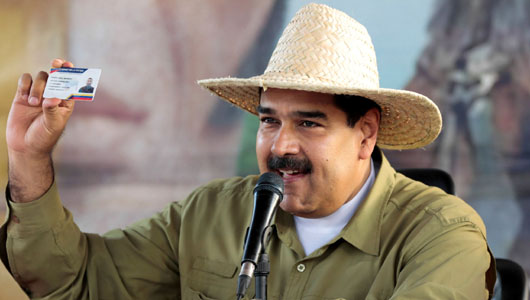by WorldTribune Staff, November 19, 2018
Venezuela has unveiled a new smart-card ID to track its citizens. The card is manufactured by Chinese telecom giant ZTE Corp.
The ID card, known as the “carnet de la patria,” or “fatherland card,” transmits data about citizens to government computer servers, Reuters reported on Nov. 18.

The report, citing critics of the fatherland card, said the new ID “illustrates how China, through state-linked companies like ZTE, exports technological know-how that can help like-minded governments track, reward, and punish citizens.”
According to employees of the ID card system and screenshots of user data reviewed by Reuters, the database stores such details as birthdays, family information, employment and income, property owned, medical history, state benefits received, presence on social media, membership of a political party, and whether a person voted.
The idea for the ID card originated in 2008 when then-President Hugo Chavez sent members of his Justice Ministry to China to learn the workings of the communist nation’s national identity card program, the report said.
In their 2008 visit to the headquarters of ZTE, members of the Venezuelan delegation said they learned how China, using smart cards, was developing a system that would help Beijing track social, political, and economic behavior.
“What we saw in China changed everything,” said technical adviser Anthony Daquin, a member of the delegation.
Daquin said his initial amazement gradually turned to fear that such a system could lead to abuses of privacy by Venezuela’s government. “They were looking to have citizen control.”
Daquin told Reuters that when he raised concerns with Venezuelan officials in 2009 he was detained, beaten and extorted by intelligence agents. They knocked several teeth out with a handgun and accused him of treasonous behavior, Daquin said, prompting him to flee the country.
Government spokespeople had no comment on Daquin’s account.
Critics say socialist President Nicolas Maduro is now using the ID cards to monitor the populace and allocate scarce resources to his loyalists.
“It’s blackmail,” Hector Navarro, one of the founders of the ruling Socialist Party and a former minister under Chavez, said of the fatherland program. “Venezuelans with the cards now have more rights than those without.”
Maduro urged citizens to sign up for the new card, calling it essential to “build the new Venezuela.” As many as 18 million people, over half the population, already have, according to government figures.
“With this card, we are going to do everything from now on,” Maduro said on state television last December.
As part of a $70 million government effort to bolster “national security,” Venezuela last year hired ZTE to build a fatherland database and create a mobile payment system for use with the card, according to contracts reviewed by Reuters.
A team of ZTE employees is now embedded in a special unit within Cantv, the Venezuelan state telecommunications company that manages the database, four current and former Cantv employees told Reuters.
Using the servers purchased from ZTE, the government is creating a database some citizens fear is identifying Venezuelans who support the government and those who don’t, the Reuters report said.
ZTE this year paid $1 billion to settle with the U.S. Commerce Department, one of various penalties after ZTE shipped telecommunications equipment to Iran and North Korea, violating U.S. sanctions and export laws. The Commerce action was sparked by a 2012 Reuters report that ZTE sold Iran a surveillance system, which included U.S. components, to spy on telecommunications by its citizens.
Legal experts in the United States told Reuters that it is unclear whether ZTE and other companies that supply the fatherland system are violating U.S. sanctions on Venezuelan leaders by providing tools that critics believe strengthen the government’s grip on power.
“China is in the business of exporting its authoritarianism,” U.S. Sen. Marco Rubio, Florida Republican, told Reuters in an email. “The Maduro regime’s increasing reliance on ZTE in Venezuela is just the latest example of the threat that Chinese state-directed firms pose to U.S. national security interests.”
Check Out Geostrategy-Direct __________ Jump Start the U.S. Media
